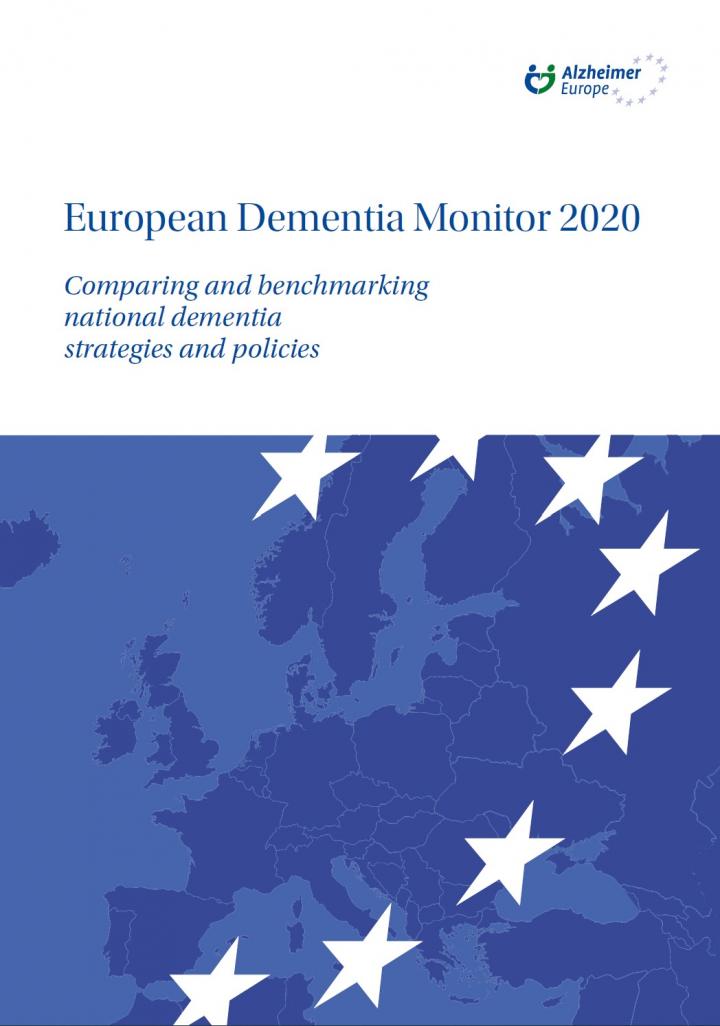Alzheimer Europe has launched a new report, ‘Dementia Monitor 2020’, providing a high-level overview of how countries across Europe have responded to the challenges posed by dementia

Credit: Alzheimer Europe
Luxembourg, 30 March 2021 – Alzheimer Europe has launched a new report, “Dementia Monitor 2020”, providing a high-level overview of how countries across Europe have responded to the challenges posed by dementia.
Alzheimer Europe’s Dementia Monitor 2020, provides a high-level overview of countries across Europe, outlining their responses to dementia, across 10 areas, including care and support services, participation in European research, policy drivers and legal protections. The report was developed by Alzheimer Europe, working together with its national member associations.
Alzheimer Europe published a similar report in 2017 which established a benchmark for countries and has made it possible to identify changes in the dementia landscape over the past three years.
Some key highlights from the Dementia Monitor 2020 include:
- Care and support services continue to be largely insufficiently available, despite some minor improvements since 2017
- A majority of care and support services continue to receive some level of financial support from the state (either fully funded or co-funded)
- An increasing number of countries are engaging in policy processes designed to prioritise dementia, for example, through the development of dementia strategies
- Countries in central and eastern Europe continue to be less well represented in clinical trials related to dementia
- A majority of countries continue to have a poor level of legal protections in place to guarantee the rights of people with dementia or carers, particularly in relation to employment matters
- There continues to be significant differences between Western and Northern European countries and those in Central and Eastern Europe in terms of how governments are responding to dementia.
Commenting on the launch of the report, Alzheimer Europe’s Executive Director, Jean Georges, stated:
“There is a mixed picture emerging from the Dementia Monitor 2020. Whilst we have seen some minor improvements in the availability and affordability of care since the 2017 Dementia Monitor, it remains the case that overall, too many services remain insufficiently available.
Whilst progress in the areas of policy and international commitments are certainly welcome, it is evident that there is still much work to do in order to translate commitments on paper into everyday reality for people living with dementia.
The number of people with dementia in Europe is likely to double by 2050, increasing from 9.78 million to 18.8 million. People with dementia and their carers must be supported throughout the duration of the illness, from the point of diagnosis through until the end of life. If this is to be achieved, particularly in light of an inevitable increase in demand for supports and services, we must see significant investment in health and social care systems to fix the shortcomings in the availability and financial support, as well as securing their long-term sustainability.
Alzheimer Europe strongly calls upon the EU to use its Cohesion Funds, including the EU4Health programme, to support Member States to address the identified gaps in care and support services for people living with dementia.”
###
To download (PDF): http://bit.
For further information, contact: Jean Georges, Executive Director, Alzheimer Europe, 14, rue Dicks, L-1417 Luxembourg, Tel.: +352-29 79 70, Fax: +352-29 79 72, [email protected], http://www.
Notes to editors:
Alzheimer Europe is the umbrella organisation of national Alzheimer associations and currently has 37 member organisations in 33 European countries. The mission statement of the organisation is to change perceptions, practice and policy to ensure equal access of people with dementia to a high level of care services and treatment options.
The 10 categories covered by the Dementia Monitor 2020 are:
- 1. The availability of care services
2. The affordability of care services
3. The reimbursement of medicines
4. The availability of clinical trials
5. The involvement of the country in European dementia research initiatives
6. The recognition of dementia as a priority
7. The development of dementia-friendly initiatives
8. The recognition of legal rights
9. The ratification of International and European human rights treaties
10. Care and employment rights.
To support people with dementia, carers and Alzheimer’s associations during the COVID-19 pandemic, the organisation has dedicated a special section of its website to useful resources and links: https:/
Media Contact
Jean Georges
[email protected]




